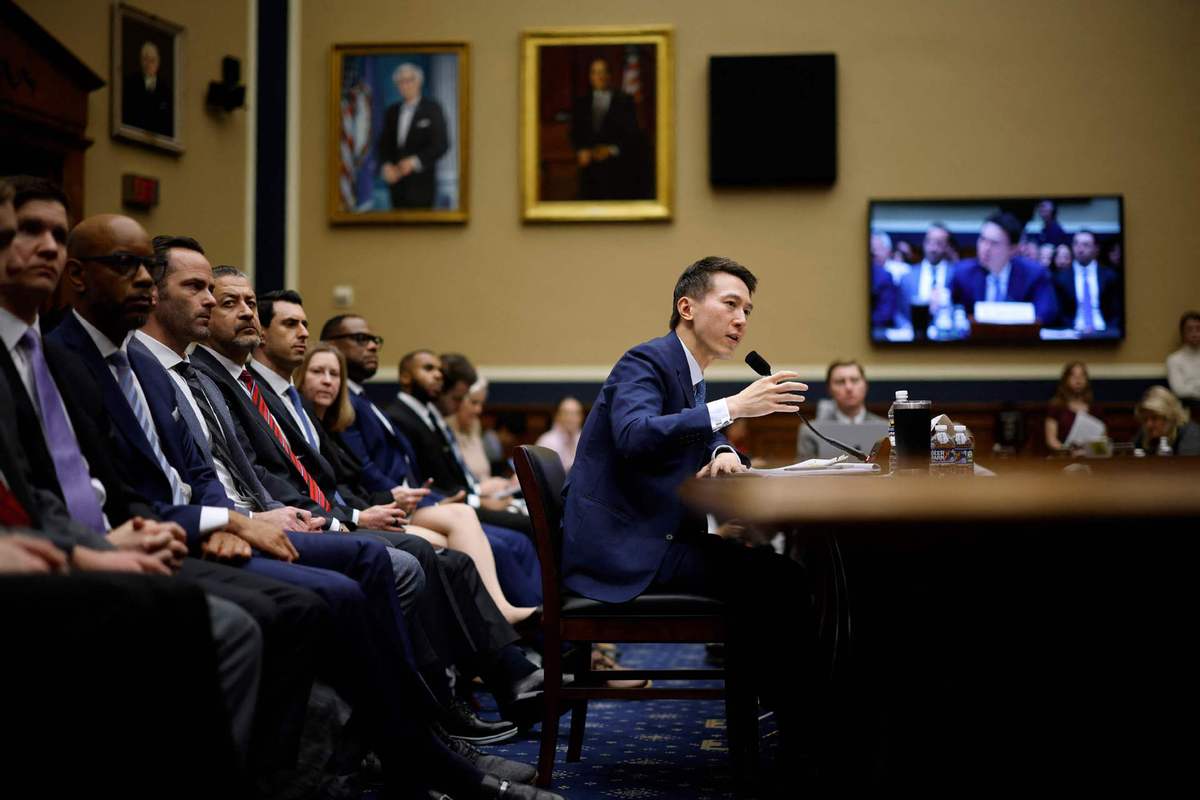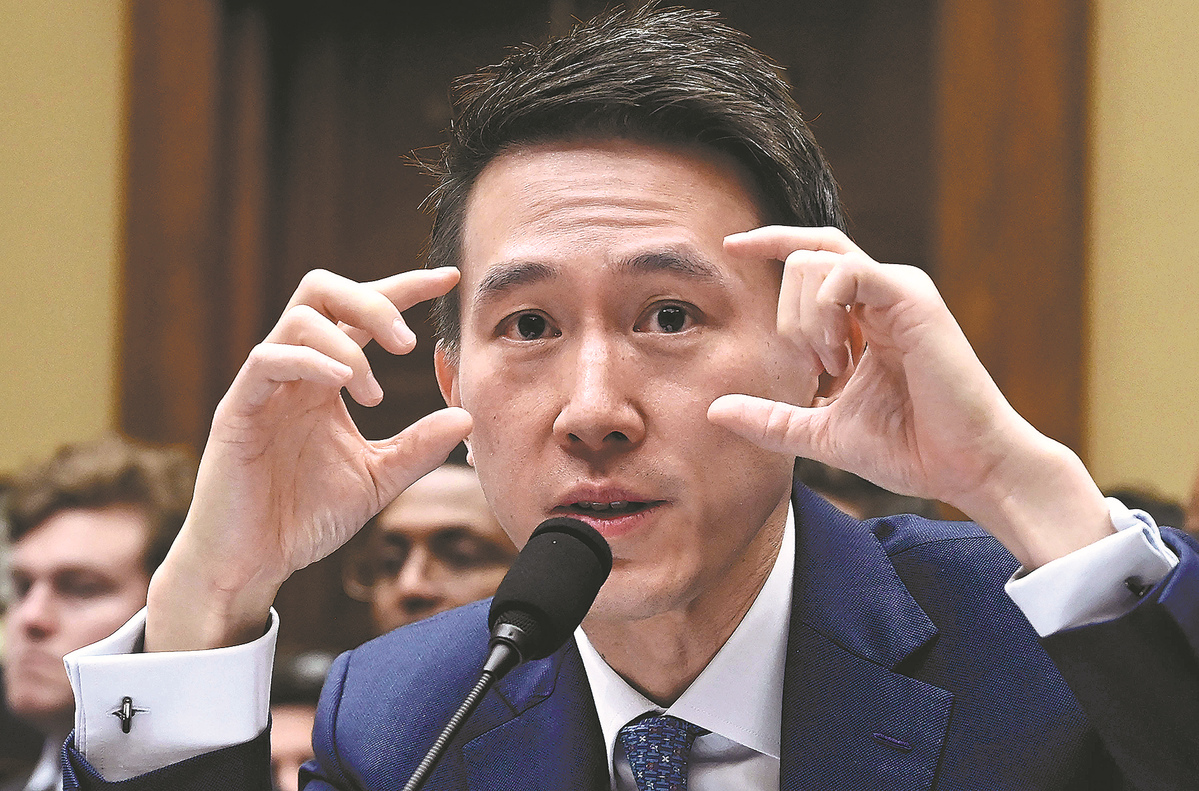Grandstanding dominates a testy hearing, as no proof offered on harm to security

TikTok Chief Executive Shou Zi Chew testifies before a House Energy and Commerce Committee hearing as lawmakers scrutinize the Chinese-owned video-sharing app, on Capitol Hill in Washington, US, March 23, 2023. REUTERS/Evelyn Hockstein
Editor's note: For more than five hours at a Congress hearing on Thursday, TikTok CEO Shou Zi Chew was grilled by US lawmakers over alleged data security and harmful content concerns of the app. This page takes a closer look at what was said during the hearing and arguments against a potential ban on TikTok.
TikTok's chief executive Shou Zi Chew appeared on Thursday at the US House Energy and Commerce Committee hearing, where lawmakers questioned him about China's influence and data privacy.
During the testimony of more than five hours, Chew repeatedly denied accusations that the app shares data or has connections with the Chinese government.
"We're headquartered in Los Angeles and Singapore, and we have 7,000 employees in the US today," Chew said. "The bottom line is this: American data stored on American soil, by an American company, overseen by American personnel."
Lawmakers in both major political parties seemed convinced that the app poses national security risks, citing its parent company Byte-Dance in Beijing, and they seemed uninterested in Chew's answers.
"Let me state this unequivocally: ByteDance is not an agent of China or any other country," Chew said.
Chew was interrupted numerous times and was not allowed to respond.
Following Representative Kat Cammack's lengthy critique of Tik-Tok's content moderation and links to China, Chew asked committee chair Cathy McMorris Rodgers if he could respond.
"No. We're going to move on," she replied.
In a post-hearing statement, Tik-Tok said: "Shou came prepared to answer questions from Congress …unfortunately, the day was dominated by political grandstanding that failed to acknowledge the real solutions already underway."
TikTok has become extremely popular in the United States, especially among young people. The platform has 150 million monthly active users in the country, including 5 million businesses that use TikTok to reach customers, according to the company.
It has come under increased scrutiny in the past few years over "national security" concerns that US users' data could be passed on to China.
The company survived a ban attempt by former president Donald Trump. The Trump administration first proposed banning the short-form video app in 2020, but that effort was stopped by federal courts, which questioned the validity of claims about national security risks.
During Thursday's hearing, lawmakers offered no evidence of Tik-Tok harming US national security interests.
"I think a lot of risks that are pointed out are hypothetical and theoretical risks," Chew said at the hearing. "I have not seen any evidence. I am eagerly awaiting discussions where we can talk about evidence and then we can address the concerns that are being raised."
To address privacy concerns, Tik-Tok said it has spent more than $1.5 billion on data security efforts under "Project Texas", which currently has nearly 1,500 full-time employees and is contracted with Oracle Corporation to store TikTok's US user data.
Outside of the hearing, TikTok gained support from several Congress members who called the proposed ban on TikTok GOP-led "hysteria" about the app's ties to China.
In December, US President Joe Biden signed a bill to ban the app on government devices. Recently, the administration has threatened to ban the app in the US, if its parent company will not sell its stakes.
Representative Jamaal Bowman of New York joined two colleagues and dozens of TikTok content creators on Wednesday in front of the Capitol to oppose the ban.
"You can ban TikTok, but there are still data brokers who sell our data to other countries. … So let's not have a dishonest conversation. Let's not be racist toward China and express our xenophobia when it comes to TikTok because American companies have done tremendous harm to American people," Bowman said at the protest.
Behind him, supporters held signs showing "Keep TikTok", "My teaching thrives on TikTok" and "My Art thrives on TikTok".
"I'm very clear on how harmful Facebook, Instagram, Twitter and YouTube have been, just to name a few. I mean, president Donald Trump used Twitter to help facilitate an insurrection, an attack on the US Capitol by US citizens. So, while we're worried about China harming our country, we are harming ourselves," Bowman said.
He said lawmakers concerned about protecting users should not target TikTok, but must instead focus on a national law that would protect user data across all social media platforms.
Chew also noted the failure of US social media companies to address the same concerns for which Tik-Tok was being criticized.
"American social companies don't have a good track record with data privacy and user security. Look at Facebook and Cambridge Analytica, just one example," he said.

TikTok CEO Shou Zi Chew
Fair competition urged
In response to the matter, China's Foreign Ministry spokeswoman Mao Ning said the US government has not provided any evidence that TikTok threatens US national security, but has time and again cracked down on the company with the presumption of guilt.
She urged the US to respect the principles of market economies and fair competition.
The Chinese government attaches high importance to and protects in accordance with law data privacy and security, Mao said at a daily news conference on Friday.
"We have never asked, and will never ask any company or individual to collect or provide data, information or intelligence located abroad against local laws," Mao said.
The US should stop suppressing foreign companies, and provide an open, fair, just and nondiscriminatory environment for foreign companies operating in the country, Mao said.
Callie Goodwin, who runs a greeting card company, said 95 percent of her orders come from Tik-Tok followers. "I'm so thankful that this app has given me the chance to grow my business and to seek this entrepreneurial journey that would not be possible without it," she said.
"A ban takes away the connections we've built, silencing communities that continue to be underrepresented and not given a voice," said Tiffany Yu, who is disabled and founded a disability advocacy organization. "TikTok has really been a game-changer for me. It's allowed me to reach new audiences."
"A ban would be an entirely un-American, undemocratic and inappropriate response to an unproven risk," Chris Stokel-Walker, author of TikTok Boom: China's Dynamite App and the Superpower Race for Social Media, wrote in a recent article for The Washington Post.
"Banning TikTok would be completely useless in combating a different, much better-evidenced social media pitfall — the spread of dangerous propaganda," he said.
"Banning one platform and ignoring the others would solve nothing, while allowing the deeper problems to fester."
Wang Qingyun in Beijing and agencies contributed to this story.





